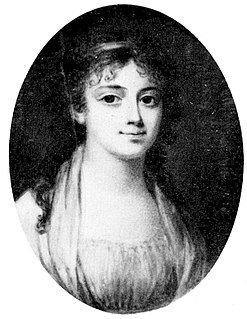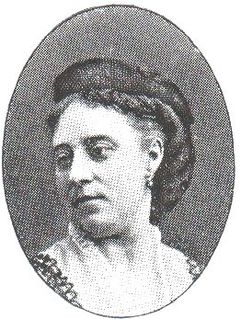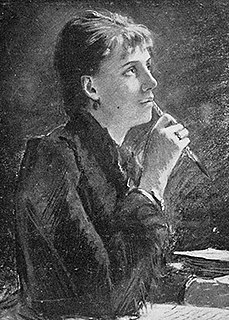Related Research Articles

Ulrika Eleonora of Denmark was Queen of Sweden as the wife of King Charles XI. She is often admired for her generosity and charity.
Martha of Denmark was Queen of Sweden by marriage to King Birger. She was given the name Margaret (Danish: Margrete Eriksdatter at birth, but in Sweden was called Martha, and has been known in history by that name. She was regarded as a politically influential queen and an important figure in the Håtuna games and the Nyköping Banquet.

Fredrica Löf, also known as Fredrique Löwen, was a Swedish stage actress. She was the first female star at the newly founded national stage Royal Dramatic Theater, which was founded the year of her debut.
Margaret(h)a Seuerling née Lindahl (1747–1820) was a Swedish actress and Theatre director in a travelling theatre company, perhaps the most known travelling actress of her time in Scandinavia, active in both Sweden and Finland. She was one of the first, perhaps the very first, to introduce secular theatre in Finland: her family and its company represents a large part of the theatre history in Sweden and Finland.
Charlotta Antonia "Charlotte Antoinette" Seuerling, was a blind Swedish concert singer, harpsichordist, composer and poet, known as "The Blind Song-Maiden". She was active in Sweden, Finland and Russia. Her last name is also spelled as Seijerling and Seyerling. Her first name was Charlotta Antoinetta, but in the French fashion of the time, she was often called Charlotte Antoinette. She was the author of the popular song "Sång i en melankolisk stund".
Catharina Ahlgren was a Swedish Proto feminist poet and publisher, and one of the first identifiable female journalists in Sweden.

Åbo Svenska Teater is a Finland-Swedish theatre in the city of Turku in Finland and the oldest theatre in the country, founded in 1839. The building itself is also the oldest still functioning theatre house in Finland. The name means "The Swedish theatre of Åbo"; Åbo is the Swedish name of the city of Turku.

Hedvig Kristina Elisabeth "Betty" Deland was a Swedish stage actress. She was a principal of the Royal Dramatic Training Academy and belong to the elite of Swedish 19th-century actors. She was known as Betty Deland until 1857 and then as Betty Almlöf.
Martin Nürenbach or Nurembach was a German acrobat, stage actor, dancer and equilibrist active in Sweden, Norway and Finland. He was a pioneer in Norwegian theater history by founding the first public theater in Oslo in the year 1771.
Karl Gustav Bonuvier, was a Swedish stage actor and theatre director, active in Sweden and Finland. He is remembered for having founded the first theatre house in Finland.

Rosalie Ulrika Olivecrona, née Roos, was a Swedish feminist activist and writer. She is one of the three great pioneers of the organized women's rights movement in Sweden, alongside Fredrika Bremer and Sophie Adlersparre.

Mathilda Valeria Beatrix d'Orozco also by marriage known as Cenami, Montgomery-Cederhjelm and Gyllenhaal, was a Swedish noble and salonist, composer, poet, writer, singer, amateur actress and harpsichordist.

Ellen Fries was a Swedish feminist and writer. She became the first female Ph.D. in Sweden in 1883.

Marie Sophie Schwartz née Birath, was a Swedish writer. She has been referred to as the most successful female writers of the late 19th-century in Sweden.

Josefina Leontina Amanda Wettergrund, née Lundberg pseudonym Lea, was a Swedish writer and poet. She was the editor of the family magazine Svalan in 1871–75.

Lovisa Mathilda Roos was a Swedish writer.

Carl Gottfried Seuerling (1727-1795) was a German born, Swedish stage actor and theater director. He was the director of the Seuerling theater Company in 1768-93 and as such the leader of one of only two professional Swedish language theater companies in Sweden of the era.
Johan Anton Lindqvist was a Swedish stage actor and theater director.
Engels teater was a historic theatre in Helsinki in Finland, active between 1827 and 1860. It was the second theater in Finland after Bonuviers Teater in Åbo, and the first theatre in Helsinki. It was located on Esplanaden at the intersection with Mikaelsgatan and was the predecessor of the Swedish Theatre.
Egges Teater was a historic theatre in Norrköping in Sweden, active between 1762 and 1798. It was the first theatre in Sweden outside the capital of Stockholm.
References
- ↑ Birger Schöldström , Seuerling och hans "comædietroupp". Ett blad ur svenska landsortsteaterns historia, 1889
- ↑ Birger Schöldström, Seuerling och hans "comædietroupp". Ett blad ur svenska landsortsteaterns historia, 1889
- ↑ Idun : Praktisk veckotidning för qvinnan och hemmet / 1889
- Birger Schöldström, Seuerling och hans "comædietroupp". Ett blad ur svenska landsortsteaterns historia , 1889
- Idun : Praktisk veckotidning för qvinnan och hemmet / 1889
- https://www.doria.fi/bitstream/handle/10024/102001/MUSIKERPRIVILEGIER%20I%20%C3%85BO%20P%C3%85%201800-TALET.pdf?sequence=2
This article may be expanded with text translated from the corresponding article in Swedish. (August 2018)Click [show] for important translation instructions.
|